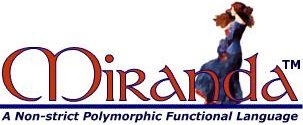
Back Luengache de programación Miranda AN Миранда (програмиране) Bulgarian Miranda (programovací jazyk) Czech Miranda (Programmiersprache) German Miranda (γλώσσα προγραμματισμού) Greek Miranda (lenguaje de programación) Spanish میراندا (زبان برنامهنویسی) Persian Linguaxe de programación Miranda Galician Miranda (linguaggio di programmazione) Italian Miranda Japanese
This article includes a list of general references, but it lacks sufficient corresponding inline citations. (September 2016) |
 | |
| Paradigm | lazy, functional, declarative |
|---|---|
| Designed by | David Turner |
| Developer | Research Software Ltd |
| First appeared | 1985 |
| Stable release | 2.066[1] |
| Typing discipline | strong, static |
| License | 2-clause BSD License[2] |
| Website | miranda |
| Major implementations | |
| Miranda | |
| Influenced by | |
| KRC, ML, SASL, Hope | |
| Influenced | |
| Clean, Haskell, Orwell, Microsoft Power Fx | |
Miranda is a lazy, purely functional programming language designed by David Turner as a successor to his earlier programming languages SASL and KRC, using some concepts from ML and Hope. It was produced by Research Software Ltd. of England (which holds a trademark on the name Miranda)[3] and was the first purely functional language to be commercially supported.[citation needed]
Miranda was first released in 1985 as a fast interpreter in C for Unix-flavour operating systems, with subsequent releases in 1987 and 1989. It had a strong influence on the later Haskell language.[4] Turner stated that the benefits of Miranda over Haskell are: "Smaller language, simpler type system, simpler arithmetic".[5]
In 2020 a version of Miranda was released as open source under a BSD licence. The code has been updated to conform to modern C standards (C11/C18) and to generate 64-bit binaries. This has been tested on operating systems including Debian, Ubuntu, WSL/Ubuntu, and macOS (Catalina).[5][6]
- ^ "Miranda download page". Retrieved 17 May 2024.
- ^ "miranda: COPYING". Retrieved 17 May 2024.
- ^ Turner, D. A. (September 1985). "Miranda: A non-strict functional language with polymorphic types" (PDF). In Jouannaud, Jean-Pierre (ed.). Functional Programming Languages and Computer Architecture. Lecture Notes in Computer Science. Vol. 201. Berlin, Heidelberg: Springer. pp. 1–16. doi:10.1007/3-540-15975-4_26. ISBN 978-3-540-39677-2.
- ^ Hudak, Paul; Hughes, John; Peyton Jones, Simon; Wadler, Philip (2007-06-09). "A history of Haskell: Being lazy with class". Proceedings of the third ACM SIGPLAN conference on History of programming languages. New York, NY, USA: ACM. doi:10.1145/1238844.1238856. ISBN 9781595937667. S2CID 52847907.
- ^ a b Turner, David (2021-03-22). "Open Sourcing Miranda". Code Sync. London (published November 2020). Retrieved 2021-12-30.
- ^ "Miranda download page". www.cs.kent.ac.uk. Retrieved 2021-12-30.
© MMXXIII Rich X Search. We shall prevail. All rights reserved. Rich X Search